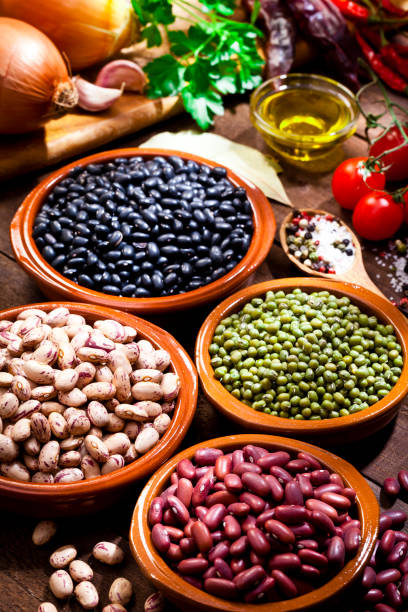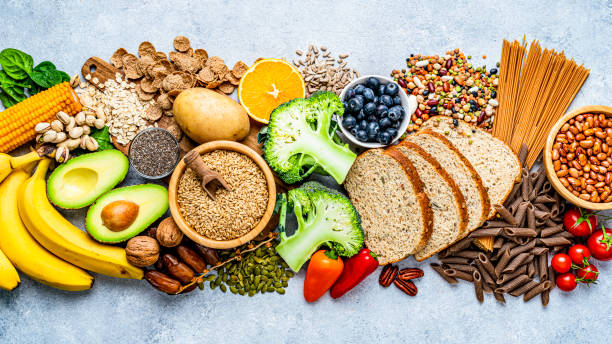In the quest for optimal health and well-being, dietary choices play a pivotal role. Among the essential components of a healthy diet, dietary fibers stand out as powerful allies in promoting overall wellness. In this blog post, we’ll explore the importance of dietary fibers, their numerous health benefits, and practical tips for incorporating them into your daily diet.

1. Understanding Dietary Fibers:
Dietary fibers are a type of carbohydrate found in plant-based foods that the body cannot digest or absorb. Instead, they pass relatively intact through the digestive tract, playing a crucial role in maintaining digestive health and promoting regularity. Unlike other food components, such as fats, proteins or carbohydrates — which your body breaks down and absorbs — fiber isn’t digested by your body. Instead, it passes relatively intact through your stomach, small intestine and colon and out of your body.
It is recommended that women aim to get a minimum of between 21 and 25 gm of fibre daily, while men should strive for 30 to 38 gm.
2. Promoting Digestive Health:
One of the primary benefits of dietary fibers is their ability to promote digestive health. Fibers add bulk to the stool, soften it, and help move it through the digestive tract, preventing constipation and promoting regular bowel movements. Adequate fiber intake is essential for preventing and managing digestive issues such as constipation, haemorrhoids, diverticulitis, and irritable bowel syndrome (IBS).
3. Supporting Heart Health:
Dietary fibers have been shown to have numerous cardiovascular benefits. Soluble fibers, in particular, can help lower LDL (bad) cholesterol levels by binding to cholesterol in the digestive tract and promoting its excretion. By reducing LDL cholesterol levels, dietary fibers can help lower the risk of heart disease, stroke, and other cardiovascular conditions.
4. Regulating Blood Sugar Levels:
Fiber-rich foods have a minimal impact on blood sugar levels, making them beneficial for individuals with diabetes or insulin resistance. Soluble fibers slow down the absorption of sugar in the bloodstream, preventing spikes in blood sugar levels after meals and promoting better glycemic control. Regular consumption of high-fiber foods can help reduce the risk of type 2 diabetes and improve overall blood sugar management.
5. Promoting Weight Management:
Dietary fibers play a key role in weight management by promoting satiety, reducing appetite, and aiding in weight loss or weight maintenance efforts. High-fiber foods tend to be lower in calories, higher in volume, and take longer to digest, helping individuals feel fuller for longer periods and consume fewer calories overall. Including fiber-rich foods in meals and snacks can help curb cravings, prevent overeating, and support healthy weight management.
6. Preventing Chronic Disease:
Adequate fiber intake has been associated with a reduced risk of various chronic diseases, including certain types of cancer, such as colorectal cancer. Fiber-rich foods contain photochemical, antioxidants, and other bioactive compounds that have protective effects against cancer and other chronic conditions. By incorporating a variety of fiber-rich foods into your diet, you can support overall health and reduce the risk of chronic disease.
The advantages of dietary fibres :
- Aids in preserving an appropriate bodily insulin level. • Helps treat diseases including bloating, which lowers the risk of diverticulitis and colon diseases.
• Because fibre cannot be broken down, it prolongs feelings of fullness, reducing the need for needless snaking.
• The decrease in bloodstream glucose spike following a big meal.
•reduces the chance of developing potentially fatal conditions like diabetes, overweight, cerebral infarction, several types of cancer, and cardiac disease.

Tips for Increasing Fibre Intake:
1. Choose Whole Grains: Opt for whole grains such as brown rice, quinoa, barley, oats, whole wheat pasta, and whole grain bread instead of refined grains. Whole grains retain the fiber-rich bran and germ, providing more nutrients and fiber than their refined counterparts.
2. Eat Plenty of Fruits and Vegetables: Aim to fill half of your plate with fruits and vegetables at each meal. Choose a variety of colourful fruits and vegetables, including leafy greens, berries, apples, oranges, broccoli, carrots, and bell peppers, as they are rich in fiber, vitamins, minerals, and antioxidants.
4. Snack on Nuts and Seeds: Nuts and seeds are nutrient-dense foods that provide a good source of fiber, healthy fats, and protein. Enjoy a handful of almonds, walnuts, pistachios, or pumpkin seeds as a satisfying snack between meals, or add them to yogurt, oatmeal, or salads for extra crunch and flavor.
5. Choose High-Fiber Breakfast Options: Start your day with a fiber-rich breakfast to fuel your body and support digestive health. Opt for whole grain cereals, oatmeal, or bran flakes topped with fresh fruit, nuts, seeds, or a dollop of yogurt for added fiber and nutrition.
6. Add Fiber-Rich Foods to Recipes: Incorporate fiber-rich ingredients into your favourite recipes to boost their nutritional content. Add vegetables to pasta sauces, soups, and stir-fries, and include beans, lentils, or chickpeas in casseroles, salads, and wraps for extra fiber and flavor.
7. Swap Refined Snacks for Fiber-Rich Alternatives: Replace processed snacks like chips, crackers, and cookies with healthier, fiber-rich options. Choose whole fruit, raw vegetables with hummus or guacamole, air-popped popcorn, or whole grain crackers topped with nut butter or avocado for satisfying and nutritious snacks.
Remember to focus on variety, balance, and moderation to ensure a well-rounded and nutritious diet that supports optimal health and well-being.
Conclusion:
Dietary fibers are an essential component of a healthy diet and play a crucial role in promoting digestive health, heart health, blood sugar regulation, weight management, and overall well-being. By including a variety of fiber-rich foods in your diet and making mindful dietary choices, you can harness the power of dietary fibers to optimize your health and vitality. Embrace the abundance of fiber-rich foods available and reap the numerous health benefits they have to offer.




